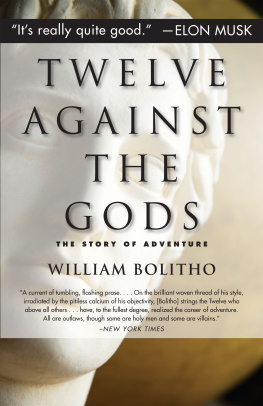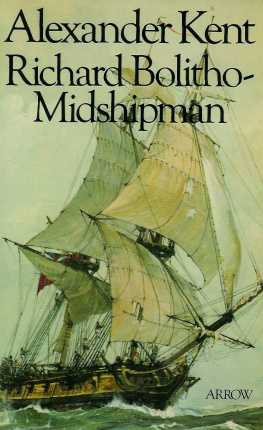
CHARLES XII OF SWEDEN
TWELVE AGAINST THE GODS
The Story of Adventure
BY
WILLIAM BOLITHO
LONDON
WILLIAM HEINEMANN LTD.
First published 1950
Printed in Great Britain at The Windmill Press , Kingswood, Surrey.
Contents
Introduction | i |
I | Alexander the Great | *3 |
II | Casanova | |
in | Christopher Columbus | |
IV | Mahomet | |
V | Lola Montez | *59 |
VI | Cagliostro (and Seraphina) | |
VII | Charles XU of Sweden | |
VIII | Napoleon I | *53 |
IX | Lucius Sergius Catiline | |
X | Napoleon m | |
XI | Isadora Duncan | 33i |
XII | Woodrow Wilson | |
&
List of Illustrations
Charles XII of Sweden | Frontispiece |
Alexander the Great | |
Portrait of Casanova | |
Christopher Columbus | |
Mahomet | |
Lola Montez | |
Cagliostro | |
Seraphina Wife of Cagliostro | |
Charles XII of Sweden | |
Sketch of Napoleon I | |
Death Mask of the Due de Reichstadt |
Son of Napoleon I | |
Ciceros Attack on Catiline in the Roman |
Senate | |
Photograph of Napoleon III | |
Photograph of Napoleon III | |
Isadora Duncan | |
President Woodrow Wilson | |
TWELVE AGAINST THE GODS
INTRODUCTION
ADVENTURE is the vitaminizing element in histories both individual and social. But its story is unsuitable for a Sabbath School prize book. Its adepts are rarely chaste, or merciful, or even law-abiding at all, and any moral peptonizing, or sugaring, takes out the interest, with the truth, of their lives.
It is so with all great characters. Their faults are not mud spots, but structural outcroppings, of an indivisible piece with their personality. But there is a special reason for the inveterate illegality, or if you prefer, wickedness, of your true adventurer, which is inherent in the concept of Adventure itself. Adventure is the irreconcilable enemy of law ; the adventurer must be unsocial, if not in the deepest sense anti-social, because he is essentially a free individualist.
This is what boysthose natural judges of the matter have been trying to mutter for centuries, when fobbed off with lives of missionaries, or generals, where varied incident in vain ornaments an essentially unadventurous character. A feat, a danger, a surprise, these are bonbons Adventure showers on those who follow her cult with a single mind. Their occurrence even repeated does not constitute a life of adventure.
Here also we renounce utterly the comfort of Mr. Kipling, who believes commuting, and soldiering in the British Army, and buying English country houses, adventurous ; and Mr. Chesterton, who is certain that a long walk on Sunday and a glass of beer set one spiritually in the company of Alexander and Captain Kidd and Cagliostro.
TWELVE AGAINST THE GODS
All this amiable misconception is as touching as the childrens wish for a good pirate, for bloodshed in which no one gets hurt, and roulette with haricot beans. Tom Sawyer knew better. The adventurer is an outlaw. Adventure must start with running away from home.
But in the mere fact that the essentially socially-minded, the good, the kind, and the respectable long to adopt the adventurer, it is clear that the opposition set between adventure and order, between the adventurer and society, is not exterior to humanity, but an inner antithesis, which divides our will.
The adventurer is within us, and he contests for our favour with the social man we are obliged to be. These two sorts of life are incompatibles ; one we hanker after, the other we are obliged to. There is no other conflict so deep and bitter as this, whatever the pious say, for it derives from the very constitutions of human life, which so painfully separate us from all other beings. We, like the eagles, were bom to be free. Yet we are obliged, in order to live at all, to make a cage of laws for ourselves and to stand on the perch. We are bom as wasteful and un-remorseful as tigers; we are obliged to be thrifty, or starve, or freeze. We are bom to wander, and cursed to stay and dig.
And so, the adventurous life is out first choice. Any baby that can walk is a splendid and typical adventuer; if they had the power as they have the will, what exploits and crimes would they not commit! We are bom adventuers, and the love of adventures never leaves us till we are very old; old, timid men, in whose interest it is that adventure should quite die out. This is why all the poets are on one side, and all the laws on the other; for laws are made by, and usually for, old men.
It is this doublemindedness of humanity that prevents a
INTRODUCTION J
dear social excommunication of the adventurer. When he appears in the flesh indeed, he can hope for no mercy. Adventure is a hard life, as these twelve cases will remind you. The moment one of these truants breaks loose, he has to fight the whole weight of things as they are; the laws, and that indefinite smothering aura that surrounds the laws that we call morals ; the family, that is the microcosm and whip-lash of society; and the dead weight of all the possessors, across whose interwoven rights the road to freedom lies. If he fails, he is a mere criminal. One-third of all criminals are nothing but failed adventurers; they usually get a stifler sentence than the rest, the imbeciles and the hungry. It is when he imposes himself and gets out of reach of the police that societys reaction is most curious. No one cares to say that Napoleon, or Alexander, or Caesar, were worse men, before any fair court, than Deadwood Dick and Jesse James ; we try to digest them. The consequences of their actions are turned into motives ; boys are urged to imitate some version of their lives from which all their disgraceful, but practicable and necessary, stepping-stones have been carefully removed.
To these perjuries and frauds, the respectable can plead crime passionnel. It is violently unpleasant to send a Napoleon to prisonthough when they had to, they did it. But in another aspect of the social problem of adventure, the deliberate trickery of the adventurous into lawfulness, the altered signpost and the camouflaged cage, we of the virtue are harder to defend. These booby traps are always set; the recruiting sergeant is always waiting at the first comer for the runaway to sell him a uniform or a flag, but in unsettled times, when the drive to adventure becomes too general and fierce for any ordinary method of society to contain, law and order do not hesitate to descend to special ruses. So the wild riders of the Middle Ages were em-












